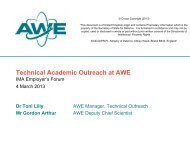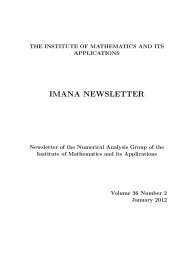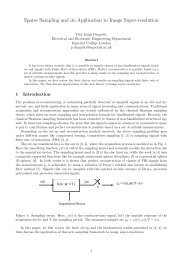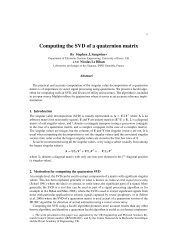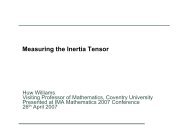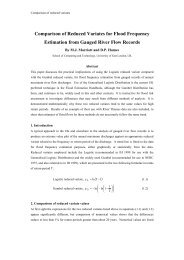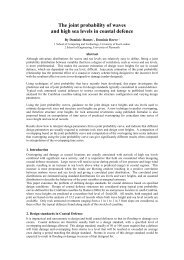Maths Arcade: stretching and supporting mathematical ... - Mathcentre
Maths Arcade: stretching and supporting mathematical ... - Mathcentre
Maths Arcade: stretching and supporting mathematical ... - Mathcentre
You also want an ePaper? Increase the reach of your titles
YUMPU automatically turns print PDFs into web optimized ePapers that Google loves.
<strong>Maths</strong> <strong>Arcade</strong>:<br />
<strong>stretching</strong> <strong>and</strong> <strong>supporting</strong><br />
<strong>mathematical</strong> thinking<br />
Mathematical Sciences HE Curriculum Innovation Project<br />
Edited by Noel-Ann Bradshaw <strong>and</strong> Peter Rowlett
<strong>Maths</strong> <strong>Arcade</strong>:<br />
<strong>stretching</strong> <strong>and</strong> <strong>supporting</strong><br />
<strong>mathematical</strong> thinking<br />
Edited by Noel-Ann Bradshaw <strong>and</strong> Peter Rowlett<br />
University of Greenwich <strong>and</strong> MSOR<br />
July 2012
<strong>Maths</strong> <strong>Arcade</strong>: <strong>stretching</strong> <strong>and</strong> <strong>supporting</strong> <strong>mathematical</strong> thinking
<strong>Maths</strong> <strong>Arcade</strong>: <strong>stretching</strong> <strong>and</strong> <strong>supporting</strong> <strong>mathematical</strong> thinking<br />
“The link between maths <strong>and</strong> board games is probably more that the games can give you insights<br />
into the mathematics, rather than maths giving you insight into games. I mean, the maths does<br />
give you some insight into games but it’s almost the other way round. By playing various games<br />
<strong>and</strong> analysing them <strong>mathematical</strong>ly you actually get more underst<strong>and</strong>ing of the maths. So you<br />
can learn a lot about logic just by analysing the whole structure of what is a strategy, for example,<br />
let alone what is a good strategy.”<br />
Professor Ian Stewart FRS, interviewed on Math/<strong>Maths</strong> Podcast, www.pulse-project.org,<br />
18 June 2012 (22:20).
<strong>Maths</strong> <strong>Arcade</strong>: <strong>stretching</strong> <strong>and</strong> <strong>supporting</strong> <strong>mathematical</strong> thinking
Contents<br />
Contents<br />
Introduction 7<br />
University of Greenwich – the original ‘<strong>Maths</strong> <strong>Arcade</strong>’ 11<br />
University of Manchester ‘<strong>Maths</strong> <strong>Arcade</strong>’<br />
– Including postgraduates, outreach <strong>and</strong> iPad apps 15<br />
University of Salford ‘<strong>Maths</strong> <strong>Arcade</strong>’ – As a project activity 17<br />
Sheffield Hallam University ‘<strong>Maths</strong> <strong>Arcade</strong>’<br />
– Feedback on a trial <strong>and</strong> plans to include in peer assisted learning 19<br />
Photos of the <strong>Maths</strong> <strong>Arcade</strong>s in action 20<br />
University of Leicester ‘<strong>Maths</strong> <strong>Arcade</strong>’<br />
– Student maths society involvement <strong>and</strong> plans for a competition 23<br />
University of Bath ‘MASH Café’<br />
– Cross-disciplinary peer support <strong>and</strong> problem solving 25<br />
University of Nottingham ‘Puzzled’ sessions<br />
– Enhancing drop-in support, open days <strong>and</strong> community outreach 27<br />
Keele University ‘<strong>Maths</strong> <strong>Arcade</strong>’<br />
– Plan of action for Mathematics Society involvement 29<br />
<strong>Maths</strong> <strong>Arcade</strong> start-up guide 31<br />
Appendix – List of games, puzzles <strong>and</strong> other resources 35
<strong>Maths</strong> <strong>Arcade</strong>: <strong>stretching</strong> <strong>and</strong> <strong>supporting</strong> <strong>mathematical</strong> thinking
Introduction<br />
Introduction<br />
The <strong>Maths</strong> <strong>Arcade</strong> is an innovative activity which aims to simultaneously support struggling<br />
learners, stretch more confident learners <strong>and</strong> encourage the development of a staff-student<br />
<strong>mathematical</strong> community.<br />
This booklet contains details of the original <strong>Maths</strong> <strong>Arcade</strong> at Greenwich, established in 2010/11,<br />
including some discussion of the advantages of running an <strong>Arcade</strong>. Case studies from seven<br />
other <strong>Maths</strong> <strong>Arcade</strong>s established in 2011/12 are presented: Manchester; Salford; Sheffield<br />
Hallam; Leicester; Bath; Nottingham; <strong>and</strong>, Keele. Authors were asked to focus on where their<br />
<strong>Maths</strong> <strong>Arcade</strong> differs from the others, in order that a range of approaches are presented.<br />
Also provided are some notes from the experience of setting up the original <strong>Maths</strong> <strong>Arcade</strong> at<br />
Greenwich in the form of a ‘start-up guide’ which raises some questions you may like to think<br />
about when setting up your own <strong>Arcade</strong>, <strong>and</strong> a list of games <strong>and</strong> other resources used.<br />
The core aims for a <strong>Maths</strong> <strong>Arcade</strong> are:<br />
a) to help support struggling learners;<br />
b) to stretch more confident learners; <strong>and</strong>,<br />
c) to encourage staff <strong>and</strong> student interaction in a social <strong>and</strong> <strong>mathematical</strong> context.<br />
In general, these aims are achieved through a drop in session where a wide variety of strategy<br />
games <strong>and</strong> puzzles are available for students to play with each other <strong>and</strong> with staff. Staff<br />
members present are also able to offer tutorial support. The <strong>Maths</strong> <strong>Arcade</strong> can be used as a<br />
place for peer mentors to meet their mentees, if such a scheme exists. Games <strong>and</strong> puzzles<br />
might be simply played, to develop a <strong>mathematical</strong>-themed social environment, or strategies<br />
<strong>and</strong> modifications to the rules might be analysed, to develop students’ <strong>mathematical</strong> thinking.<br />
Beyond this, each <strong>Maths</strong> <strong>Arcade</strong> has a slightly different implementation adapted to suit local<br />
circumstances <strong>and</strong> most have included additional aims <strong>and</strong> objectives in addition to the core<br />
set. Some examples are given below; further details are in the case studies.<br />
Competitions: The case studies from Greenwich, Leicester <strong>and</strong> Sheffield Hallam all discuss<br />
the use of competitions around the <strong>Maths</strong> <strong>Arcade</strong>. Greenwich used a weekly puzzle as part of<br />
a termly competition. Leicester plans to run a games event where groups of students compete<br />
against each other in playing the <strong>Maths</strong> <strong>Arcade</strong> games. Sheffield Hallam used the <strong>Arcade</strong> to<br />
launch a speed Rubik’s Cube competition.<br />
Use in curriculum activities: The games, <strong>and</strong> particularly their analysis, could be used<br />
to develop project activities in an appropriate module on game theory, OR or computer<br />
programming. The case study from Salford describes the analysis of games as part of a formal<br />
student project.<br />
Cross-disciplinary activities: The case studies at Bath, Greenwich <strong>and</strong> Nottingham used<br />
the <strong>Maths</strong> <strong>Arcade</strong> to develop activities with other disciplines. At Bath this was a shared, crossdisciplinary<br />
session encouraging students from different disciplines to collaborate on analysing<br />
the games <strong>and</strong> develop cross-discipline peer support groups. Greenwich <strong>and</strong> Nottingham<br />
worked to encourage schools of engineering to run their own <strong>Maths</strong> <strong>Arcade</strong> sessions.<br />
The original <strong>Maths</strong> <strong>Arcade</strong> was set up by Noel-Ann Bradshaw at the University of Greenwich<br />
in September 2010. This was funded initially by a University grant for innovative teaching<br />
<strong>and</strong> later by the <strong>Maths</strong>, Stats <strong>and</strong> OR (MSOR) Network. As a result of dissemination of the<br />
Greenwich <strong>Maths</strong> <strong>Arcade</strong> via events at Greenwich [1], Birmingham [2] <strong>and</strong> Exeter [3], other<br />
<strong>Arcade</strong>s have been started elsewhere with <strong>and</strong> without support from the MSOR Network.<br />
In 2011/12 the MSOR Network started a coordination project to provide a focus for training
<strong>Maths</strong> <strong>Arcade</strong>: <strong>stretching</strong> <strong>and</strong> <strong>supporting</strong> <strong>mathematical</strong> thinking<br />
<strong>and</strong> collaboration between <strong>Maths</strong> <strong>Arcade</strong>s <strong>and</strong> to produce this booklet giving case studies of<br />
different implementations.<br />
The <strong>Maths</strong> <strong>Arcade</strong>s at Salford, Sheffield Hallam, Leicester <strong>and</strong> Keele had their games <strong>and</strong> puzzles<br />
(but no funding for, for example, staff time) provided by the MSOR Network. The <strong>Maths</strong> <strong>Arcade</strong>s<br />
at Greenwich <strong>and</strong> Manchester received support from their own universities, augmented with<br />
partial support from the MSOR Network. The MASH Café at Bath was supported by the National<br />
HE STEM Programme South West Spoke, augmented with partial support from the MSOR<br />
Network. The <strong>Maths</strong> <strong>Arcade</strong> at Nottingham was wholly financed by an internal university grant. All<br />
eight <strong>Maths</strong> <strong>Arcade</strong>s benefitted from meetings, training <strong>and</strong> coordination provided by the MSOR<br />
Network. The MSOR Network support for the <strong>Maths</strong> <strong>Arcade</strong> was provided as part of the National<br />
HE STEM Programme.<br />
The concept of the <strong>Maths</strong> <strong>Arcade</strong> has also been rolled out to some schools <strong>and</strong> nonmathematics<br />
faculties such as business <strong>and</strong> engineering (more details can be found in this<br />
booklet <strong>and</strong> other publications [4] [5] [6]).<br />
This guide presents ideas for different ways that universities have implemented the <strong>Maths</strong><br />
<strong>Arcade</strong> concept. This is a concept which does a lot of good simultaneously <strong>and</strong> is fairly<br />
adaptable to different needs. It is not expensive to set up. A page <strong>supporting</strong> the <strong>Maths</strong> <strong>Arcade</strong><br />
user community will be maintained on the Institute of Mathematics <strong>and</strong> its Applications website<br />
via www.ima.org.uk/viewItem.cfm?cit_id=384191. We hope that this community will continue to<br />
grow as others are inspired by this booklet to try their own <strong>Maths</strong> <strong>Arcade</strong> activities. If you do so,<br />
please get in touch (N.Bradshaw@gre.ac.uk) to connect to the wider community.<br />
Noel-Ann Bradshaw <strong>and</strong> Peter Rowlett, June 2012
Introduction<br />
Events<br />
1. Bradshaw, N., 2011. The University of Greenwich <strong>Maths</strong> Café. Developing <strong>mathematical</strong> thinking<br />
through problems, puzzles <strong>and</strong> games, MSOR Network, University of Greenwich, 1 July.<br />
2. Bradshaw, N., 2011. The University of Greenwich <strong>Maths</strong> <strong>Arcade</strong>. Ideas Exchange: HE<br />
Mathematics Curriculum Innovation, MSOR Network, University of Birmingham, 9 July.<br />
3. Bradshaw, N., 2011. The University of Greenwich <strong>Maths</strong> Café: a tool for <strong>supporting</strong> <strong>and</strong><br />
challenging learners <strong>and</strong> aiding retention. Transition, Induction <strong>and</strong> Peer-Assisted Learning<br />
seminar, National HE STEM Programme South West Spoke, University of Exeter, 7 June.<br />
Publications<br />
4. Bradshaw, N., 2011. The University of Greenwich <strong>Maths</strong> <strong>Arcade</strong>. MSOR Connections, 11(3),<br />
pp. 26-29.<br />
5. Bradshaw, N. <strong>and</strong> Lakin, S., 2012. The Greenwich <strong>Maths</strong> <strong>Arcade</strong>: A Tool For Nurturing<br />
The Inquiring Mind. Compass: The Journal of Learning <strong>and</strong> Teaching at the University of<br />
Greenwich, 5, pp. 5-9.<br />
6. Bradshaw, N., 2012. Building on the <strong>Maths</strong> <strong>Arcade</strong>: <strong>supporting</strong> mathematics learning. In: C.<br />
Robinson (ed.). Student-centred Approaches in Mathematics. MSOR Network, pp. 13-16.
<strong>Maths</strong> <strong>Arcade</strong>: <strong>stretching</strong> <strong>and</strong> <strong>supporting</strong> <strong>mathematical</strong> thinking<br />
10
University of Greenwich – the original ‘<strong>Maths</strong> <strong>Arcade</strong>’<br />
University of Greenwich<br />
– the original ‘<strong>Maths</strong> <strong>Arcade</strong>’<br />
Noel-Ann Bradshaw<br />
Stretch <strong>and</strong> Support<br />
The Greenwich <strong>Maths</strong> <strong>Arcade</strong> was a project devised to stretch our most able students <strong>and</strong> those<br />
who have more prior <strong>mathematical</strong> knowledge, whilst at the same time support those with weaker<br />
backgrounds or who take a little longer to grasp necessary <strong>mathematical</strong> concepts.<br />
The objectives included providing a weekly drop-in session where students could play various<br />
strategy board games <strong>and</strong> puzzles designed to hone <strong>and</strong> develop strategic thinking, alongside<br />
providing a safe place for them to obtain help on tutorial work. Having read the book on<br />
Mathematical Thinking by John Mason et al. [1] for a review in MSOR Connections [2], I was<br />
aware that the ability to strategize does not always come easily to our students. Interestingly,<br />
<strong>and</strong> perhaps unexpectedly given the nature of the subject, the 2011 National Student Survey<br />
showed that mathematics students do not consider themselves to be confident in dealing with<br />
unfamiliar problems ([3], p. 28). Problem solving is one of the key employability attributes that<br />
we tell our students they will develop on a maths degree, so anything that can be done to aid<br />
<strong>and</strong> increase this is well worth doing.<br />
The project began in September 2010 funded by a University of Greenwich grant for innovative<br />
teaching practice. Having researched a number of strategy games <strong>and</strong> puzzles a wide-ranging<br />
selection was assembled <strong>and</strong> leaflets were produced to advertise the ‘<strong>Maths</strong> <strong>Arcade</strong>’. An initial<br />
lecture on ‘How to Think Mathematically’ grabbed the attention of new first year students <strong>and</strong><br />
helped to draw the first students in. Attendance over two terms was fairly constant with about<br />
25-30 attending each week. This included a core group of about 15 who came most weeks,<br />
with others coming less regularly on different occasions.<br />
Which Games?<br />
The intention was not to start another ‘chess club’ but rather to increase interaction between<br />
students <strong>and</strong> to get them talking about the games <strong>and</strong> the strategies involved rather than<br />
just enjoying playing competitively. There are a number of quite unusual board games on the<br />
market. One of the students’ favourites so far is ‘Quarto’ which contains playing pieces with<br />
four different attributes:<br />
• size – tall <strong>and</strong> short;<br />
• colour – light <strong>and</strong> dark;<br />
• fill – hollow <strong>and</strong> solid;<br />
• shape – round <strong>and</strong> square.<br />
The aim is to be the player to complete a row of four containing the same attribute; for example,<br />
four tall pieces regardless of colour, fill or shape, or four round pieces regardless of size, colour<br />
or fill. What makes this game more interesting is that you do not choose which piece to play but<br />
your opponent chooses your piece for you. So a winning strategy might be to try to engineer<br />
a situation where your opponent is only left with pieces that give you a win. This is easier said<br />
than done as it is hard to keep track of all the different possibilities that might produce a win.<br />
No two games are the same <strong>and</strong> there are numerous ways that the students can investigate<br />
winning strategies. A list of games used is included in the appendix to this booklet.<br />
11
<strong>Maths</strong> <strong>Arcade</strong>: <strong>stretching</strong> <strong>and</strong> <strong>supporting</strong> <strong>mathematical</strong> thinking<br />
Benefits to students<br />
The benefits to students were more varied than had been anticipated. The weekly puzzle <strong>and</strong><br />
board games stretched the most able but also provided new students who did not initially<br />
know each other with an occasion to socialise <strong>and</strong> mingle with their peers in an unthreatening<br />
situation. <strong>Maths</strong> students are often socially shy <strong>and</strong> this gave them an opportunity to form<br />
friendships in a safe environment. Related to this, a recent report suggested that the <strong>Maths</strong><br />
<strong>Arcade</strong> could offer a structured social element well suited to students with autistic spectrum<br />
disorders (ASD) including Asperger syndrome as it “builds naturally on shared interests <strong>and</strong><br />
enthusiasms for exploring mathematics <strong>and</strong> problem solving” ([4], pp. 33-34).<br />
Students particularly liked the opportunity to spend time <strong>and</strong> play these games with staff<br />
outside the classroom environment <strong>and</strong> beat them! A recent summary of evidence from the<br />
HEA reported that “interacting with staff has been shown to have a powerful impact on learning,<br />
especially when it takes place outside of the classroom <strong>and</strong> responds to individual student<br />
needs” ([5], p. 8).<br />
Many students also made use of the tutorial help that was offered at the same time. They<br />
appreciated the fact that a number of members of staff were on h<strong>and</strong> to answer student<br />
queries <strong>and</strong> set them in the right direction. Those who made use of this were often the students<br />
who would not have visited something br<strong>and</strong>ed as a ‘help session’ because they do not like<br />
to acknowledge, even to themselves, that they are having difficulties with the material. Staff<br />
benefitted from being able to get to know a number of students in a relaxed <strong>and</strong> informal setting.<br />
Student Feedback<br />
As part of their Personal Development Planning, first year students were asked to write about<br />
a maths event in which they had participated <strong>and</strong> this could include the <strong>Maths</strong> <strong>Arcade</strong>. About<br />
two thirds of the cohort chose to comment on this. The only negative comments received were<br />
that one hour was not enough <strong>and</strong> it might be better after lectures rather than before. Positive<br />
comments included:<br />
“I like to go to the <strong>Maths</strong> <strong>Arcade</strong> because all of my tutors attend it”<br />
“The people who were once strangers to me when I first started [attending the <strong>Maths</strong> <strong>Arcade</strong>]<br />
are now some of my closest friends.”<br />
“I felt somewhat dubious about the word ‘enjoyable’ being used but I’m glad to say I was<br />
quickly proved wrong.”<br />
“[It is] a really good way to meet people <strong>and</strong> get to know the lecturers in a more<br />
informal environment.”<br />
“Attending <strong>Maths</strong> <strong>Arcade</strong> has been a major help for me this year <strong>and</strong> a huge factor in me<br />
having such successful <strong>and</strong> enjoyable studies.”<br />
Evaluation<br />
The <strong>Maths</strong> <strong>Arcade</strong> has been particularly successful in attracting a large cross-section of<br />
maths students. Other extra-curricular activities such as the <strong>Maths</strong> Society have tended to<br />
interest a particular type of student whereas this appealed to students of all backgrounds <strong>and</strong><br />
<strong>mathematical</strong> ability. The most rewarding aspect of the <strong>Maths</strong> <strong>Arcade</strong> is that our retention <strong>and</strong><br />
progression rates, though always being good, were noticeably higher in 2011 despite having<br />
doubled our intake of first year students. This is something that was appreciated both by<br />
department <strong>and</strong> University senior management. Of course there are many other contributing<br />
factors but it is believed that the <strong>Maths</strong> <strong>Arcade</strong> played a substantial part in this.<br />
12
University of Greenwich – the original ‘<strong>Maths</strong> <strong>Arcade</strong>’<br />
Expansion<br />
During the 2010/11 academic year the <strong>Maths</strong> <strong>Arcade</strong> obtained support from the MSOR<br />
Network as part of the National HE STEM Programme to extend <strong>and</strong> increase the provision in<br />
2011/12. This has allowed us to run staff training sessions, purchase more games <strong>and</strong> extend<br />
our opening times to three hours per week instead of just one. This support has also enabled<br />
us to share our positive experiences with the University’s School of Engineering.<br />
During the first year the focus of the <strong>Maths</strong> <strong>Arcade</strong> was on social interaction. One extension<br />
that is being made this year is to encourage the students more explicitly to analyse these<br />
games <strong>mathematical</strong>ly. They could work out whether the person who moves first is more likely<br />
to win, examine how to force a winning position, see what happens when the rules are modified<br />
slightly, <strong>and</strong> even design their own strategy games. We also have some excellent computer<br />
programmers attending these sessions who are being encouraged to program these games.<br />
The concept of the <strong>Maths</strong> <strong>Arcade</strong> has also been taken up by other departments. Currently two<br />
departments in the Business School <strong>and</strong> one in Engineering at Greenwich have started their<br />
own <strong>Maths</strong> <strong>Arcade</strong>s. Schools have also expressed an interest. The University of Greenwich now<br />
has a team of STEM ambassadors who take the games <strong>and</strong> puzzles into schools to promote<br />
the ideas behind strategic thinking.<br />
Conclusions<br />
This idea came about because of a perceived need to simultaneously stretch <strong>and</strong> support<br />
maths students. It involved taking a risk <strong>and</strong> trying something new <strong>and</strong> untested. Over the last<br />
two years we have adapted our provision in regard to student feedback <strong>and</strong> have had to make<br />
changes due to University <strong>and</strong> other constraints. This project has succeeded in ways that had<br />
not been foreseen <strong>and</strong> appears to have made a real difference to student engagement retention<br />
<strong>and</strong> achievement which demonstrates the value of trying speculative ideas. I would encourage<br />
you to try a new idea. It may not work but on the other h<strong>and</strong> it might <strong>and</strong> could benefit students<br />
<strong>and</strong> staff in many institutions.<br />
References<br />
1. Mason, J., Burton, L. <strong>and</strong> Stacey, K., 2010. Thinking Mathematically. Second Edition. Pearson.<br />
2. Bradshaw, N., 2010. Book Review: Thinking Mathematically. MSOR Connections, 10(3),<br />
pp. 49-50.<br />
3. Hewson, P., 2011. Preliminary Analysis of the National Student Survey. MSOR Connections,<br />
11(1), pp. 25-28.<br />
4. Martin, N. <strong>and</strong> Cliffe, E., 2011. Assisting mathematics students who have Asperger<br />
syndrome. In: E. Cliffe <strong>and</strong> P. Rowlett, Good Practice on Inclusive Curricula in the<br />
Mathematical Sciences, MSOR Network, pp. 31-36.<br />
5. Trowler, V. <strong>and</strong> Trowler, P., 2010. Student Engagement Evidence Summary.<br />
Higher Education Academy.<br />
13
<strong>Maths</strong> <strong>Arcade</strong>: <strong>stretching</strong> <strong>and</strong> <strong>supporting</strong> <strong>mathematical</strong> thinking<br />
14
University of Manchester ‘<strong>Maths</strong> <strong>Arcade</strong>’ – Including postgraduates, outreach <strong>and</strong> iPad apps<br />
University of Manchester ‘<strong>Maths</strong> <strong>Arcade</strong>’ –<br />
Including postgraduates, outreach <strong>and</strong> iPad apps<br />
Louise Walker<br />
After reading about the <strong>Maths</strong> <strong>Arcade</strong> developed at the University of Greenwich in MSOR<br />
Connections [1], I was keen to pilot a similar scheme in the School of Mathematics at the<br />
University of Manchester. As well as developing students’ strategy <strong>and</strong> problem solving skills<br />
the main aim of our <strong>Maths</strong> <strong>Arcade</strong> was to create a space where maths undergraduates,<br />
postgraduates <strong>and</strong> staff could meet informally to share <strong>mathematical</strong> ideas. We are lucky to<br />
have plenty of common space in our School but the undergraduate <strong>and</strong> postgraduate/staff<br />
common rooms are on separate floors. This means that postgraduates <strong>and</strong> staff have plenty<br />
of opportunity to mix socially but for most undergraduates, their main contact with staff <strong>and</strong><br />
postgraduates is during formal classes.<br />
The School was supportive of the idea of a <strong>Maths</strong> <strong>Arcade</strong> <strong>and</strong> so we bought some of the<br />
games <strong>and</strong> puzzles recommended in the MSOR Connections article <strong>and</strong> some iPads from<br />
our School budget <strong>and</strong> launched the <strong>Maths</strong> <strong>Arcade</strong> in March 2012. The idea was to pilot the<br />
scheme until the end of the academic year to get ideas for activities <strong>and</strong> find out what extra<br />
resources to buy for a proper launch at the start of the following academic year. The <strong>Arcade</strong><br />
took place in a large classroom <strong>and</strong> we provided drinks <strong>and</strong> biscuits. Although the attendance<br />
has been quite low (about 20 people), there was a good mix of undergraduates from all four<br />
years, postgraduates <strong>and</strong> staff, <strong>and</strong> feedback from students attending the <strong>Maths</strong> <strong>Arcade</strong> has<br />
been positive. Some people came for the games <strong>and</strong> puzzles, while others wanted to talk about<br />
different areas of maths. We had some interesting discussions on topics ranging from second<br />
order logic to the integration of graduate skills into our undergraduate programmes!<br />
Several of the students who attended the <strong>Maths</strong> <strong>Arcade</strong> are currently working with local schools<br />
<strong>and</strong> colleges as <strong>Maths</strong> Ambassadors. We were lucky to have one of the <strong>Maths</strong> Busking team [2],<br />
Katie Steckles, attend some of the sessions to share ideas <strong>and</strong> activities with the ambassadors.<br />
The students used the iPads to look up <strong>mathematical</strong> terms <strong>and</strong> we shared some interesting<br />
YouTube videos including one of a robot solving a Rubik’s cube <strong>and</strong> an explanation of how to turn<br />
a sphere inside out. We’ve looked at iPad apps suitable for the <strong>Maths</strong> <strong>Arcade</strong>. These included:<br />
• Trainyard;<br />
• Kokono;<br />
• Rush Hour;<br />
• iHanoi;<br />
• Solitaire Chess;<br />
• Magic Cube;<br />
• Torus Games.<br />
We plan to relaunch the <strong>Maths</strong> <strong>Arcade</strong> at the start of the next academic year with a special<br />
session in Induction Week for our new students together with their peer mentors. As well as the<br />
games <strong>and</strong> iPad apps we intend to have a weekly maths puzzle <strong>and</strong> create a bank of resources<br />
that can be used in our outreach activities.<br />
References<br />
1. Bradshaw, N., 2011. The University of Greenwich <strong>Maths</strong> <strong>Arcade</strong>. MSOR Connections,<br />
11(3), pp. 26-29.<br />
2. <strong>Maths</strong> Busking. Available via: http://mathsbusking.com/ [last accessed June 2012].<br />
15
<strong>Maths</strong> <strong>Arcade</strong>: <strong>stretching</strong> <strong>and</strong> <strong>supporting</strong> <strong>mathematical</strong> thinking<br />
16
University of Salford ‘<strong>Maths</strong> <strong>Arcade</strong>’ – As a project activity<br />
University of Salford ‘<strong>Maths</strong> <strong>Arcade</strong>’<br />
– As a project activity<br />
Edmund Chadwick<br />
We started running the <strong>Maths</strong> <strong>Arcade</strong> at Salford in November 2011. This is run in a weekly<br />
session from 12-2 on a Wednesday which provides students with a social outlet <strong>and</strong> a focus<br />
for the discussion of mathematics puzzles of all descriptions. This also provides a convenient<br />
backdrop to any maths open days that happen to fall on a Wednesday afternoon.<br />
In addition, the puzzles <strong>and</strong> games have been incorporated into a second year mathematics<br />
module that aims to develop problem-solving skills. Students study the various games <strong>and</strong><br />
puzzles, in particular by playing the games against other students, <strong>and</strong> the discussion of the<br />
games themselves leads to underst<strong>and</strong>ing of the strategies required to play effectively.<br />
The module assessment requires the completion of a report <strong>and</strong> also includes marks originating<br />
from their in-class involvement assessed by the module coordinator at weekly meetings. To<br />
complete the report, students focus on particular games or puzzles of interest to them, describe<br />
the rules, positions, moves, tactics <strong>and</strong> strategies for either a solution or for playing well. The<br />
students have the choice to either undertake this individually or in teams of their choosing. The<br />
teams that form generally reflect the groups that naturally arise when playing <strong>and</strong> discussing<br />
games during the classes.<br />
One important aspect of this work is to start moving away from a linguistic description towards<br />
a <strong>mathematical</strong> description. So, one of the key elements in the report is the development of a<br />
<strong>mathematical</strong> notation that allows a full description of the game or puzzle. Students must also<br />
demonstrate an attempt at <strong>mathematical</strong> modelling using the notation in order to develop a<br />
solution or a strategy for playing the game well.<br />
Student feedback for this activity was very positive. The majority reported enjoying the module<br />
to a higher degree than other modules, <strong>and</strong> the reports are of a st<strong>and</strong>ard noticeably higher than<br />
their other assessments. Given how well it trialled, the intention is to deliver this assessment<br />
permanently within this problem-solving module.<br />
17
<strong>Maths</strong> <strong>Arcade</strong>: <strong>stretching</strong> <strong>and</strong> <strong>supporting</strong> <strong>mathematical</strong> thinking<br />
18
Sheffield Hallam University ‘<strong>Maths</strong> <strong>Arcade</strong>’ – Feedback on a trial <strong>and</strong> plans to include in peer assisted learning<br />
Sheffield Hallam University ‘<strong>Maths</strong> <strong>Arcade</strong>’ –<br />
Feedback on a trial <strong>and</strong> plans to<br />
include in peer assisted learning<br />
Claire Cornock <strong>and</strong> Erik Baxter<br />
A four week trial of the <strong>Maths</strong> <strong>Arcade</strong> was held just before the Easter vacation by a group of<br />
five staff at Sheffield Hallam. The <strong>Maths</strong> <strong>Arcade</strong> was advertised to the students via email <strong>and</strong><br />
mentioned in tutorials. Opinions of the <strong>Maths</strong> <strong>Arcade</strong> were sought from all students; feedback<br />
was received from five out of the nine students who had attended during the trial <strong>and</strong> from<br />
21 who didn’t. The students who did attend described the atmosphere as “fun”, “chilled” <strong>and</strong><br />
“enjoyable”. They all liked the games <strong>and</strong> wanted to attend again. Despite the low numbers,<br />
there has been a great reaction generally from the students about the <strong>Maths</strong> <strong>Arcade</strong>. Based<br />
on the feedback from those who didn’t attend the trial the low numbers were because of<br />
workloads (48%) <strong>and</strong> timetabling (43%), with specific comments including:<br />
• “If I wasn’t busy, <strong>and</strong> in year 1 or 2, I probably would have come along as it does sound<br />
interesting <strong>and</strong> fun!”;<br />
• “It is on a Wednesday which is a day when we are off uni.”<br />
Of the students who didn’t attend, 38% were interested in attending in the future <strong>and</strong> 38%<br />
are undecided.<br />
As requested by the first year students we held a Rubik’s cube championship. Students from<br />
different year groups took part in the competition, which attracted a supportive audience of<br />
students <strong>and</strong> staff. Our champion was incredibly quick, completing the cube in roughly 40<br />
seconds in each round.<br />
As part of the BSc Mathematics programme the first year students take part in a peer assisted<br />
learning (PAL) scheme which involves working on a group project with leadership from a final<br />
year student (PAL leader). The <strong>Maths</strong> <strong>Arcade</strong> will be brought to the PAL introductory session<br />
during induction week. This is the session when the first year students meet their PAL leader<br />
<strong>and</strong> the staff member allocated to oversee the process. The PAL leaders <strong>and</strong> staff will be<br />
introduced to some of the games before this session <strong>and</strong> will be encouraged to use the<br />
games as ice breakers. Subsequent <strong>Maths</strong> <strong>Arcade</strong> sessions will be optional <strong>and</strong> will be at<br />
a time convenient for the first year students, but ideally at a time when students from other<br />
year groups are also available. Having a session in which the <strong>Maths</strong> <strong>Arcade</strong> is introduced will<br />
hopefully reduce the number of students who don’t think it sounds interesting (currently 19%).<br />
Other future plans include providing details of sessions on printed timetables, advertising the<br />
maths help side of the sessions (43% of those who didn’t attend would be likely to attend if<br />
they could get help on tutorial questions) <strong>and</strong> holding more championships.<br />
19
<strong>Maths</strong> <strong>Arcade</strong>: <strong>stretching</strong> <strong>and</strong> <strong>supporting</strong> <strong>mathematical</strong> thinking<br />
<strong>Maths</strong> <strong>Arcade</strong>s in action<br />
Clockwise from top left:Sheffield<br />
Hallam University, University<br />
of Greenwich, University of<br />
Greenwich, University of<br />
Greenwich, Sheffield Hallam<br />
University, University of Greenwich<br />
<strong>and</strong> University of Bath<br />
20
<strong>Maths</strong> <strong>Arcade</strong>: <strong>stretching</strong> <strong>and</strong> <strong>supporting</strong> <strong>mathematical</strong> thinking<br />
21
<strong>Maths</strong> <strong>Arcade</strong>: <strong>stretching</strong> <strong>and</strong> <strong>supporting</strong> <strong>mathematical</strong> thinking<br />
22
University of Leicester ‘<strong>Maths</strong> <strong>Arcade</strong>’ – Student maths society involvement <strong>and</strong> plans for a competition<br />
University of Leicester ‘<strong>Maths</strong> <strong>Arcade</strong>’<br />
– Student maths society involvement<br />
<strong>and</strong> plans for a competition<br />
Jeremy Levesley<br />
When the call came out for the <strong>Maths</strong> <strong>Arcade</strong> I contacted colleagues in the department<br />
responsible for Learning <strong>and</strong> Teaching, <strong>and</strong> for Student Support, <strong>and</strong> also Greg Matthews, the<br />
Chair of the Student Mathematics Society (SUMS). I asked them if they thought that the <strong>Maths</strong><br />
<strong>Arcade</strong> was a good idea, <strong>and</strong> the unanimous response was affirmative.<br />
We have a ready-made machine for organising the playing of the games inside our House<br />
System. The Department is divided into four houses Euler, Gauss, Newton, <strong>and</strong> Noether,<br />
the purpose being to produce a small world feel for the students. Each house has a student<br />
president <strong>and</strong> a staff head. All staff <strong>and</strong> students in the department are attached to one house,<br />
staff being attached to the house of their personal tutees.<br />
Various departmental activities <strong>and</strong> competitions are organised at the house level. The <strong>Maths</strong><br />
<strong>Arcade</strong> has been delivered through the House Hour, which happens fortnightly. In principle,<br />
each house has around 120 students, <strong>and</strong> around 30 students typically attend the hour, which<br />
has refreshments provided. The games have been brought along to the hour <strong>and</strong> staff <strong>and</strong><br />
students have played.<br />
Having been one of the players I can say that it provides a nice even playing field in which staff<br />
<strong>and</strong> students can compete. Students enjoy the opportunity of being better than staff, <strong>and</strong> we<br />
enjoy the chance of being shown to be human!<br />
The intention is that a small number of games will be used in an inter-house competition, with<br />
house points being awarded to the winners (just as at ‘Hogwarts’). Students have been learning<br />
the games during the spring term, <strong>and</strong> the competition will take place in the summer term.<br />
The role of SUMS has been crucial in this. Greg <strong>and</strong> his colleagues have played a number of the<br />
games to try to find ones which are appropriate for the House Hour <strong>and</strong> competition. They have<br />
looked after the storage of the games <strong>and</strong> delivery to <strong>and</strong> from the House Hour. The running of<br />
the competition is under their control.<br />
There is mixed take up by staff of House Hours, <strong>and</strong> other personal tutor related activities. We<br />
will discuss in Departmental Management Group the issue of making House Hour directed time<br />
for staff with inclusion on the workload allocation model.<br />
I will finish off with quotes from staff <strong>and</strong> students concerning the playing of the games:<br />
• “The games were a good way of getting to know other students as well as lecturers <strong>and</strong> it was<br />
fun thinking through the strategies of the games.” Lucy Harris, student<br />
• “The games were given a good reception by students. By choosing games that no one had<br />
seen before it meant that everyone was learning the games <strong>and</strong> developing their strategy at<br />
the same time which resulted in lecturers <strong>and</strong> students learning from each other <strong>and</strong> neither<br />
having a distinct advantage. The games allowed students to get to know lecturers in a more<br />
informal way.” Greg Mathews, student<br />
• “Thoroughly enjoyed playing the maths arcade games, a great collection of logical games that<br />
I found are simple to underst<strong>and</strong> but very challenging to master.” Chris Cuthbert, student<br />
• “I thoroughly enjoyed playing against the students where they had as much chance of winning<br />
as I did. It allowed for us to interact in a more relaxed but equally intellectual way. The games<br />
were good too.” Jeremy Levesley, lecturer.<br />
23
<strong>Maths</strong> <strong>Arcade</strong>: <strong>stretching</strong> <strong>and</strong> <strong>supporting</strong> <strong>mathematical</strong> thinking<br />
24
University of Bath ‘MASH Cafe’ – Cross-disciplinary peer support <strong>and</strong> problem solving<br />
University of Bath ‘MASH Café’ – Crossdisciplinary<br />
peer support <strong>and</strong> problem solving<br />
Emma Cliffe <strong>and</strong> Jane White, MASH (Mathematics Resource Centre), University of Bath<br />
Lisa Benjamin <strong>and</strong> Carol Lacey, University of Bath Students’ Union<br />
MASH, the institutional Mathematics Resource Centre at Bath, in collaboration with the<br />
Students’ Union (SU), set up the MASH Café in October 2011. MASH runs mathematics <strong>and</strong><br />
statistics drop-in support for all students each afternoon during term time. MASH also runs<br />
drop-ins staffed by peer mentors for first year mathematics students <strong>and</strong> the SU organises Peer<br />
Assisted Learning sessions within a variety of disciplines. The original <strong>Maths</strong> <strong>Arcade</strong>, in addition<br />
to other aims, offered drop-in mathematics support. At Bath MASH already provided adequate<br />
drop-in opportunities. However, we offered limited opportunities for students to develop their<br />
problem solving skills. Offering strategy games in an informal café environment appeared to be<br />
a context in which open ended problem solving <strong>and</strong> peer support might naturally arise. Hence<br />
the MASH Café was set up to:<br />
• provide opportunities for students to develop problem solving skills;<br />
• encourage students to form cross-disciplinary peer support groups to support their<br />
<strong>mathematical</strong> development.<br />
To attract students across a range of disciplines the Café was held in the SU building <strong>and</strong> ran<br />
5.30-7.00pm one evening a week. Two members of staff agreed to attend despite this falling<br />
outside of office hours. It was hoped that senior students would eventually start to run the Café.<br />
The Café was funded by a small National HE STEM Programme South West Spoke transition<br />
grant which covered: strategy games chosen to promote problem solving; a storage box; table<br />
cloths; refreshments; <strong>and</strong>, advertising.<br />
The Café was attended by seven to twelve students (not always the same students) <strong>and</strong> three<br />
staff each week. Asking attendees how we might attract other students highlighted timetabling<br />
<strong>and</strong> communication difficulties with cross-discipline activities. The teaching day at Bath runs<br />
8.15am-7.05pm (excepting Wednesday afternoon). Most students travel across the city each<br />
day <strong>and</strong> students only came to the Café if it was shortly after a lecture <strong>and</strong> did not clash. We<br />
also had no direct method of communicating with students; many attending had not noticed the<br />
advertisements! Those attending felt the Café should run for a longer period on a Wednesday<br />
afternoon. This would require students to take responsibility for running the Café <strong>and</strong> we hope<br />
to trial this next year. A mailing list was set up <strong>and</strong> some attendees have agreed to play games<br />
at a central location during Freshers’ week, advertising the Café <strong>and</strong> asking interested students<br />
to sign up to the list.<br />
The students who attended, as well as enjoying the games, did start to pose <strong>and</strong> try to answer<br />
questions about strategies, algorithms <strong>and</strong> ideas behind game solving. Some games became<br />
favourites for this such as Solomon’s Stones, Quarto, Quoridor <strong>and</strong> Hex. Individuals also<br />
brought their own puzzles <strong>and</strong> games along as the Café offered the unique opportunity to play<br />
with other like-minded people. Individuals <strong>and</strong> groups often spent the entire session attempting<br />
to underst<strong>and</strong> best gaming strategies <strong>and</strong> puzzle solutions. As a result, discussions focussed<br />
on problem solving strategies, developing proofs <strong>and</strong> algorithms as well as learning <strong>and</strong> thinking<br />
styles arose spontaneously.<br />
Comments from attendees on why the MASH Café should run include: “fun games which make<br />
you think!”; “fun, intellectually strenuous”; “unique <strong>and</strong> fun”; “social <strong>and</strong> problem solving<br />
combined”; “it is a fun way to think about problems”. We hope that this early success will be<br />
extended next academic year as we tackle the timetabling <strong>and</strong> communication difficulties.<br />
25
<strong>Maths</strong> <strong>Arcade</strong>: <strong>stretching</strong> <strong>and</strong> <strong>supporting</strong> <strong>mathematical</strong> thinking<br />
26
University of Nottingham ‘Puzzled’ sessions – Enhancing drop-in support, open days <strong>and</strong> community outreach<br />
University of Nottingham ‘Puzzled’ sessions<br />
– Enhancing drop-in support,<br />
open days <strong>and</strong> community outreach<br />
Sally Barton<br />
At Nottingham we have a Teaching Officer who has a role in <strong>supporting</strong> the first year students<br />
making the transition to university mathematics <strong>and</strong> this includes drop in sessions for first year<br />
students. These sessions were reasonable well attended <strong>and</strong> a postgraduate student was<br />
employed to supplement the support during the busier sessions. We were aware, however, that<br />
the students who most needed to be there often didn’t come.<br />
This year the School moved into its own building (having previously had offices across two<br />
buildings <strong>and</strong> shared with physics <strong>and</strong> engineering). The new building had better provision for<br />
student study areas <strong>and</strong> areas that were identifiable as ‘for mathematics students’.<br />
We were successful in bidding for money from the university for promoting tutor group activity<br />
<strong>and</strong> interactions between staff <strong>and</strong> students. The Head of School also requested that we<br />
bid for strategy games to use with engineering students. The money was used to provide<br />
two cupboards <strong>and</strong> a large variety of games. As well one in as Mathematical Sciences, a<br />
cupboard plus games was sited in the Engineering <strong>and</strong> Science Learning Centre (which also<br />
opened this year).<br />
One drop-in session was moved to the undergraduate study area <strong>and</strong> has been reasonably<br />
successful. The sessions were called ‘Puzzled’ <strong>and</strong> were advertised as:<br />
New for academic year 2011: special ‘Puzzled’ drop in sessions will be running where you can<br />
play puzzles. You can also bring maths problems that are puzzling you.<br />
The hope that lecturers would make themselves available in Puzzled sessions during their office<br />
hours has not happened with only two lecturers participating. We hope to change this next<br />
year: the more that students see <strong>mathematical</strong> conversations happening between staff <strong>and</strong><br />
students, the more they realise that they too can ask questions.<br />
The games were used <strong>and</strong> maths conversations were started (“can I ask you a question?”)<br />
by students who had not attended the traditional drop in sessions. There was also interaction<br />
between staff <strong>and</strong> second year students <strong>and</strong> between the year groups. Hopefully this aspect<br />
will grow next year.<br />
The games were also used at our open days. We have had games before but they usually are<br />
not seen in the department from one open day to the next. It was good to introduce students<br />
to, e.g., Quarto <strong>and</strong> say that they would get the opportunity to play again if they come to study<br />
maths here. Indeed small Quarto sets have been purchased for tutor groups <strong>and</strong> we will be<br />
holding a Quarto competition between tutor groups during induction week.<br />
The engineering cupboard was not well used this year. This appears to be because it was not<br />
in place until after the main welcoming activities had ended <strong>and</strong> the cupboard was kept locked<br />
most of the time. This cupboard was used when we took part in the University of Nottingham<br />
‘MayFest’. This is community open day; a Saturday when the local community are encouraged<br />
to come onto campus for a range of activities. We were able to wheel the cupboard with the<br />
games to the venue <strong>and</strong> use it to store surplus items (<strong>and</strong> coats <strong>and</strong> bags) during the day. With<br />
games for all ages <strong>and</strong> logic puzzles, etc., we were busy all day. A parent was overheard saying<br />
to children: “I know we could stay here all day but there other things to go <strong>and</strong> see”.<br />
27
<strong>Maths</strong> <strong>Arcade</strong>: <strong>stretching</strong> <strong>and</strong> <strong>supporting</strong> <strong>mathematical</strong> thinking<br />
28
Keele University ‘<strong>Maths</strong> <strong>Arcade</strong>’ – Plan of action for Mathematics Society involvement<br />
Keele University ‘<strong>Maths</strong> <strong>Arcade</strong>’ – Plan of<br />
action for Mathematics Society involvement<br />
David Bedford<br />
Over the last year the Department has encouraged students to form a Mathematics Society<br />
to improve both the student experience <strong>and</strong> also the relationship between staff <strong>and</strong> students.<br />
The intention was to have the Mathematics Society <strong>and</strong> staff organise drop in sessions where<br />
staff <strong>and</strong> students could play <strong>and</strong> discuss the various games as well as the opportunity for<br />
more general issues to be raised in a friendly <strong>and</strong> relaxed environment. This was going to<br />
be introduced within the new mathematics workroom which was due to be completed by<br />
Christmas 2011. Unfortunately a series of delays has resulted in this being pushed back to<br />
September 2012. Nevertheless, the success of the Mathematics Society <strong>and</strong> the willingness of<br />
staff to engage with the project mean that the <strong>Maths</strong> <strong>Arcade</strong> will commence in September 2012<br />
with the new cohort of undergraduates.<br />
Plan of Action<br />
• Initial meeting arranged at the start of September with the new executive of the Mathematics<br />
Society. Ideas to be discussed are:<br />
o Possible competition/prize.<br />
o Student volunteers from 2nd <strong>and</strong> 3rd years to supervise the sessions.<br />
o Training for new Executive <strong>and</strong> student volunteers.<br />
o Organisation of a launch event.<br />
• Ideas <strong>and</strong> Feedback Forum on the VLE.<br />
• Arrange regular (weekly/fortnightly?) sessions.<br />
Evaluation<br />
• Maintain a record of student engagement.<br />
• Feedback questionnaires at the end of each Semester of the first year.<br />
Further Development <strong>and</strong> Sustainability<br />
• Embedding the roles of <strong>Maths</strong> <strong>Arcade</strong> supervision into the Executive of the <strong>Maths</strong> Society.<br />
29
<strong>Maths</strong> <strong>Arcade</strong>: <strong>stretching</strong> <strong>and</strong> <strong>supporting</strong> <strong>mathematical</strong> thinking<br />
30
<strong>Maths</strong> <strong>Arcade</strong> start-up guide<br />
<strong>Maths</strong> <strong>Arcade</strong> start-up guide<br />
Noel-Ann Bradshaw<br />
This start-up guide is based on the experience of setting up the original <strong>Maths</strong> <strong>Arcade</strong> at the<br />
University of Greenwich <strong>and</strong> focuses on practicalities.<br />
Funding <strong>and</strong> purchasing of equipment<br />
The initial University grant in 2010 was for £1,650. The appendix to this booklet contains a<br />
list of all the games <strong>and</strong> puzzles that were bought initially at Greenwich as well as others that<br />
have since been purchased or recommended. A mobile, lockable, storage cupboard was also<br />
purchased from this funding to store <strong>and</strong> transport the games.<br />
Rooming<br />
Discussions on storing the cupboard <strong>and</strong> equipment, <strong>and</strong> the timetabling or rooming of sessions<br />
need to be carried out as early as possible, depending on your situation. At Greenwich we were<br />
initially allocated a classroom seating 56. In 2011 we were allocated a larger classroom with plenty<br />
of circulation space <strong>and</strong> comfortable seating in the area outside to enable some of the games<br />
to be played in a more relaxed environment. It is necessary for students to be able to sit around<br />
tables <strong>and</strong> play the games; the <strong>Maths</strong> <strong>Arcade</strong> would not work in a fixed-seat lecture theatre.<br />
Staffing<br />
It is important to get the agreement <strong>and</strong> commitment of several members of staff <strong>and</strong> PhD<br />
students to turn up each week. One of the main benefits of running the <strong>Arcade</strong> is to enable<br />
staff-student interaction. Running a training workshop to show staff <strong>and</strong> PhD tutors the<br />
importance <strong>and</strong> advantage of attending <strong>and</strong> enabling them to try out some of the games is a<br />
good idea before the sessions actually start.<br />
The <strong>Maths</strong> <strong>Arcade</strong> provides a good way to get to know a reasonable number of students well in<br />
a short space of time so staff could be encouraged to use this as one of their office hours or as<br />
a designated time <strong>and</strong> place to meet project students.<br />
Advertising<br />
Without promoting sessions well students are unlikely to turn up. Early promotion in the<br />
induction week works best <strong>and</strong> continued mentions in lectures will encourage new members<br />
each week. Incorporating some of the <strong>Maths</strong> <strong>Arcade</strong> games <strong>and</strong> puzzles into the start of term<br />
induction activities is a good strategy. If you organise some sort of peer mentoring scheme<br />
encourage mentors to arrange to meet their mentees there.<br />
Weekly Operation<br />
This needs commitment of a couple of members of staff to be there each week even if others<br />
attend on a rota basis. You could provide weekly puzzles, perhaps as part of a competition. There<br />
are many sources for puzzles including the Institute of Mathematics <strong>and</strong> its Applications website<br />
<strong>and</strong> books by authors such as Henry Dudeney, Sam Lloyd, Martin Gardner <strong>and</strong> Ian Stewart.<br />
It is useful to keep a list of those students who attend for evaluation purposes.<br />
31
<strong>Maths</strong> <strong>Arcade</strong>: <strong>stretching</strong> <strong>and</strong> <strong>supporting</strong> <strong>mathematical</strong> thinking<br />
Evaluating <strong>and</strong> feedback<br />
It is useful to obtain written feedback on the <strong>Maths</strong> <strong>Arcade</strong> from those attending <strong>and</strong> not attending<br />
the sessions. This can be done as a questionnaire or linked into existing Personal Development<br />
Portfolio (PDP) or similar scheme. In the first year at Greenwich the most negative feedback was<br />
that there were not enough sessions, these were not long enough <strong>and</strong> they might be better taking<br />
place after rather than before lectures. Some students said they did not know what it was <strong>and</strong><br />
were really surprised to find they enjoyed it when they did attend <strong>and</strong> wished that it could have<br />
been advertised more. There were no negatives comments concerning the content.<br />
32
<strong>Maths</strong> <strong>Arcade</strong> start-up guide<br />
33
<strong>Maths</strong> <strong>Arcade</strong>: <strong>stretching</strong> <strong>and</strong> <strong>supporting</strong> <strong>mathematical</strong> thinking<br />
34
Appendix – List of games, puzzles <strong>and</strong> other resources<br />
Appendix<br />
– List of games, puzzles <strong>and</strong> other resources<br />
Noel-Ann Bradshaw<br />
List of games <strong>and</strong> puzzles<br />
This list is an indication of the games available at the <strong>Maths</strong> <strong>Arcade</strong>. We tried to get a number<br />
of games that would be suitable for a group of students to play – particularly important at<br />
the start. Some, such as Giant Blokus, have been particularly successful as students like to<br />
watch even if they are not playing. We obtained some word games for students whose first<br />
language is not English. This list is not a definitive list as it was bought under constraints of<br />
time, money <strong>and</strong> University procurement policy. I would welcome suggestions for other items<br />
(N.Bradshaw@gre.ac.uk).<br />
Abalone<br />
Bananagrams<br />
Blokus 3D/<br />
Blockus Giant/<br />
Blockus Trigon<br />
Callisto<br />
Chaos<br />
Gambit<br />
Gobblet<br />
Gygès<br />
Hex<br />
Ingenious<br />
Joggle<br />
2 player strategy game. The objective is to push six of the opponent’s<br />
fourteen marbles off the edge of the hexagonal board following a set<br />
of simple rules. A good game but you don’t want too many sets. Many<br />
students like this.<br />
2-8 player word game. Using lettered tiles to spell words.<br />
Good for international students if you can find a group of a similar ability to<br />
play together.<br />
2-4 player strategy game. Involves placing polyomino-based tiles onto a<br />
board to capture available space. Giant version is great for several students<br />
to play <strong>and</strong> watch.<br />
2-4 player game. Looks bright <strong>and</strong> childish but students that have played<br />
it have got a lot out of it. Easy to pick up but tricky to come up with the<br />
best strategy.<br />
2 player strategy game. Involves stacking counters. Excellent strategy<br />
game but hard to learn. Takes longer than other games once both players<br />
underst<strong>and</strong> the rules.<br />
2 player strategy game. Involves sliding rows of coloured tiles. Enjoyable<br />
but not one of the most popular games.<br />
2 player strategy game. Placing or moving already placed pieces, including<br />
larger pieces covering smaller ones, to make a row of four on a 4x4 grid. A<br />
good, easy to master, strategy game.<br />
2 player strategy game. The object of the game is to move a piece to your<br />
opponent’s last row. The catch is no one owns the pieces.<br />
2 player game said to be invented by mathematician John Nash. It can be<br />
bought from Nestor Games (see below). Hex boards can also be made<br />
relatively easily or can be played on paper. See boardgamegeek for paper grid.<br />
1-4 player strategy game. Placing tiles on a board with a clever scoring<br />
system. Good for strategy. Travel version is easier to play but full-size<br />
version can be watched by more students.<br />
2 player strategy game. Dice-based placement of marbles on a board. First<br />
to build a 6 marble rectangle wins.<br />
35
<strong>Maths</strong> <strong>Arcade</strong>: <strong>stretching</strong> <strong>and</strong> <strong>supporting</strong> <strong>mathematical</strong> thinking<br />
MiQube<br />
Neuron<br />
Novem<br />
Pentago<br />
Pylos<br />
Q-bitz<br />
Quads<br />
magnetic<br />
Quarto<br />
Quirky<br />
Quixo<br />
Quorridor<br />
Rubik’s cube/<br />
Hollow cube/<br />
Sudoku cube<br />
Rubik’s 360<br />
Rubik’s magic<br />
Rumis<br />
Rush Hour<br />
Saikoro<br />
1-4 players. It can be played by one player reassembling the cube or as a<br />
board game encouraging strategic thinking. It encourages special thinking.<br />
A good review on boardgamegeek:<br />
http://boardgamegeek.com/thread/261372/review-miqube<br />
1-4 players. Similar to Tantrix but less complex rules. Aim is to make the<br />
longest line of your colour.<br />
2 player tactical game. Lots of game theory involved in this. One person<br />
controls rows <strong>and</strong> the other columns <strong>and</strong> you try <strong>and</strong> capture tiles with the<br />
highest value. Strategy involves trying to work out what your opponent is<br />
going to do.<br />
2 player strategy game. Placing coloured marbles on a 6x6 board, the<br />
quadrants of which can be rotated, to form five in a row. Rules are easy to<br />
follow but the strategies take longer to assimilate. Excellent short game.<br />
2 player strategy game. Placing marbles to form a pyramid according to<br />
simple rules. Whoever places the top marble wins. Best with players of<br />
equal ability.<br />
2-4 player game. Three rounds based on speed, chance <strong>and</strong> memory.<br />
Arrange mini-cubes to make patterns. Good for encouraging symmetric<br />
visualisation.<br />
2 player game. The tiles have different combinations of colours or lines.<br />
Players take turns placing a tile so that the colours or lines on each edge<br />
match that of adjacent tiles. The player who stops his or her opponent from<br />
being able to place a tile wins. Not played very much as yet.<br />
2-4 player strategy games. Object is to get a row of 4 pieces with the same<br />
attribute. The catch is that your opponent chooses your piece for you.<br />
2-3 player strategy game. Uses coloured tokens to build equilateral triangles.<br />
Not got the hang of this game yet! Instructions are not well-explained.<br />
2-4 player strategy game. Adding <strong>and</strong> shifting tokens to form five in a row.<br />
Excellent strategy game that requires 100% concentration.<br />
2-4 player strategy game. Each player aims to move a pawn to the other<br />
side of the board but can place walls to obstruct their opponent. Good<br />
for programmers.<br />
The classic puzzle <strong>and</strong> variants. There are many books <strong>and</strong> websites<br />
explaining how to explain Group Theory using a Rubik’s Cube.<br />
Puzzle. Involves changing the position of six coloured balls in a central<br />
sphere to six coloured compartments in an outer sphere, by manoeuvring<br />
them through a middle sphere that only has two holes.<br />
Puzzle. Folding connected tiles to form a pattern.<br />
2-4 player strategy game. Involves placing blocks onto a board as part of a<br />
3D structure to capture available space. Not played much.<br />
1 or more player strategy game. The objective is to move a red car out of a<br />
six-by-six grid by moving the other vehicles out of its way. There are many<br />
variations on this including online versions <strong>and</strong> apps for iPads etc. Similar to<br />
Red Donkey.<br />
2 player game with lots of dice. Easy to earn <strong>and</strong> demonstrated on ‘Board<br />
Games with Scott’. Involves finding a way of removing dice to trap your<br />
opponent. http://www.boardgameswithscott.com/?p=84<br />
36
Appendix – List of games, puzzles <strong>and</strong> other resources<br />
Solomon’s<br />
stones<br />
Sprocket<br />
Square up<br />
Stratum<br />
Sudoku cards<br />
Tantrix<br />
Toteml<strong>and</strong><br />
Tower of Hanoi<br />
2 player strategy game. A variant on Nim’s game. Excellent for<br />
encouraging thinking <strong>and</strong> strategy <strong>and</strong> possibly not too difficult for the<br />
more able to program.<br />
2-4 player strategy game. Using rotor pieces to create gears <strong>and</strong> lugs. An<br />
excellent strategy game once you have understood all the rules – not easy!<br />
Like Sam Lloyd’s 15-puzzle. We have developed a program in Excel that<br />
produces a r<strong>and</strong>om 5x5 grid as the provided 4x4 is too easy. This now<br />
means that we can have 6 people play together with the program.<br />
2-4 player strategy game. Trying to cover the opponents’ pieces by placing<br />
tiles. An excellent game for discussing what the best strategy is.<br />
2-5 player strategy game. Involves placing numbered cards according to<br />
sudoku rules.<br />
1-4 player strategy game. Hexagonal tile-based placement. Good but hard<br />
to teach complexities of rules <strong>and</strong> time consuming.<br />
2-4 player. Excellent strategy game. You build totem poles but you want to<br />
have as many of your pieces on top at the end. The rules of placing pieces<br />
make this harder than it seems. Excellent game.<br />
The classic puzzle<br />
The classic games Backgammon, Chess, Draughts, Go, Reversi (Othello), as well as playing<br />
cards are available at the <strong>Arcade</strong> but are not described in the list above.<br />
Other resources<br />
There are several websites that I have found useful for sourcing games <strong>and</strong> finding out about<br />
them although most of the above can be purchased via Amazon.<br />
I recommend registering with BoardGameGeek.com for their reviews <strong>and</strong> files containing<br />
English rules – necessary as often the translations provided are tricky to comprehend!<br />
BoardGameswithScott.com is another interesting resource with video instructions for some games.<br />
I have recently come across NestorGames.com which seems to have a good supply of unusual<br />
strategy games. If you try any please let me know (N.Bradshaw@gre.ac.uk).<br />
The article in this booklet by Louise Walker from the University of Manchester discussed the use<br />
of iPads <strong>and</strong> recommends some apps.<br />
37
<strong>Maths</strong> <strong>Arcade</strong>: <strong>stretching</strong> <strong>and</strong> <strong>supporting</strong> <strong>mathematical</strong> thinking<br />
38
Appendix – List of games, puzzles <strong>and</strong> other resources<br />
39
<strong>Maths</strong> <strong>Arcade</strong>: <strong>stretching</strong> <strong>and</strong> <strong>supporting</strong> <strong>mathematical</strong> thinking<br />
40
The <strong>Maths</strong> <strong>Arcade</strong> is an innovative activity involving<br />
playing <strong>and</strong> analysing strategy games which aims<br />
to simultaneously support struggling learners,<br />
stretch more confident learners <strong>and</strong> encourage<br />
the development of a staff-student <strong>mathematical</strong><br />
community. This booklet contains details of the<br />
original <strong>Maths</strong> <strong>Arcade</strong> at Greenwich, including some<br />
discussion of the advantages of running an <strong>Arcade</strong>,<br />
<strong>and</strong> case studies from seven other <strong>Maths</strong> <strong>Arcade</strong>s<br />
since established at Manchester, Salford, Sheffield<br />
Hallam, Leicester, Bath, Nottingham <strong>and</strong> Keele.<br />
This work was supported by the Mathematical<br />
Sciences HE Curriculum Innovation Project,<br />
operated by the <strong>Maths</strong>, Stats <strong>and</strong> OR (MSOR)<br />
Network as part of the Mathematical Sciences<br />
Str<strong>and</strong> of the National HE STEM Programme. Find<br />
out more at www.mathstore.ac.uk/hestem


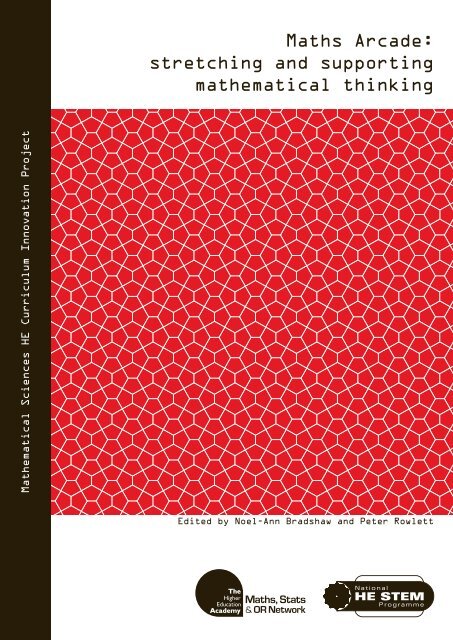
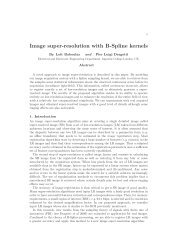
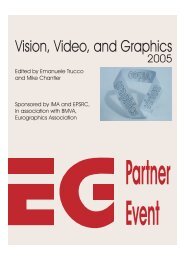
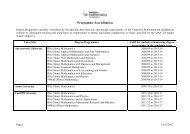
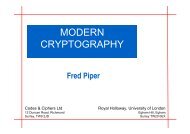
![Download NLAO Application Form [PDF] - Institute of Mathematics ...](https://img.yumpu.com/22617151/1/184x260/download-nlao-application-form-pdf-institute-of-mathematics-.jpg?quality=85)
![Download Education Grants Application Form [PDF] - Institute of ...](https://img.yumpu.com/22617149/1/184x260/download-education-grants-application-form-pdf-institute-of-.jpg?quality=85)
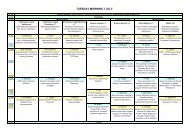
![IMA IPD brochure [PDF] - Institute of Mathematics and its Applications](https://img.yumpu.com/22617139/1/189x260/ima-ipd-brochure-pdf-institute-of-mathematics-and-its-applications.jpg?quality=85)
